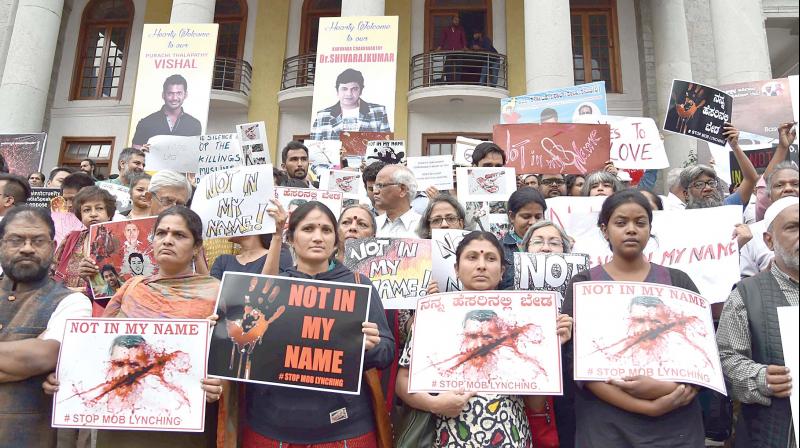#NotInMyName: Bengaluru rises against lynch mobs
“They have killed people in the name of cow. As Indians, we have to be good to everyone. We are one.

Bengaluru: Hundreds of people from different walks of life braved the evening rain and traffic jams at Town Hall on Wednesday to show solidarity with the victims of recent lynching incidents across the country.
From 79-year-old writer, actor and director Girish Karnad, who was on oxygen for breathing problems, to six-year-old Muhammad Usaid, the demonstrators held hands and shouted, “Hindu, Muslim, Sikh ya Christian: bhai-bhai, bhai-bhai.”
“They have killed people in the name of cow. As Indians, we have to be good to everyone. We are one,” said the first-grade student Usaid, who was holding placard, “Can we have peace?”
Historian and writer Ramachandra Guha was happy with the large turnout. “The people gathered here care for the future of our country. This is all about civility, humanity and decency,” he said.
#NotInMyName campaign started with a Facebook post on June 24 by Saba Dewan, an independent filmmaker based in Delhi, demanding a call for action against lynching. The image designed by artist Orijit Sen featuring blood-stained chappals and a metal rod went viral the next day on social media websites.
The protesters sang, “Hum honge kamyab…,” and raised slogans demanding justice and equality for all.
“Follow our PM, hug one beef-eater,” read one of the placards with a photograph of Modi and Trump hugging each other.
College student Priyanka G.N. said, “The sight of placards in Kannada, Hindi, Tamil, Malayalam and Bengali electrified me and made me stay till the end despite the rain. The victims are not alone or neglected anymore, everyone has the right to be secure and secular.”
Social activist Mohammad Akram Sait said, “I strongly condemn the surgical strikes against humanity. The government is taking certain steps to promote its vested interests, but it has to change.”
Keerthana Kumar, theatre artist, said that targeted killings and lynch mobs should not exist in a civilised country that upholds secularism. “The government should be responsible enough to acknowledge such issues and the majority of the population should act as agents to protect the rights of the minorities.”
“The demonstration saw people representing themselves without the help of any party,” said an activist who was part of the initial discussions on the campaign.
Mr Kshitij Urs, professor in Public Policy, said the big turnout despite the strong social-media counter-campaigning speaks volumes about the growing sentiment. “The proactive social media agenda setters (who are in power) were forced to take such a defensive stance exposes the truth behind the current situation,” he said.

